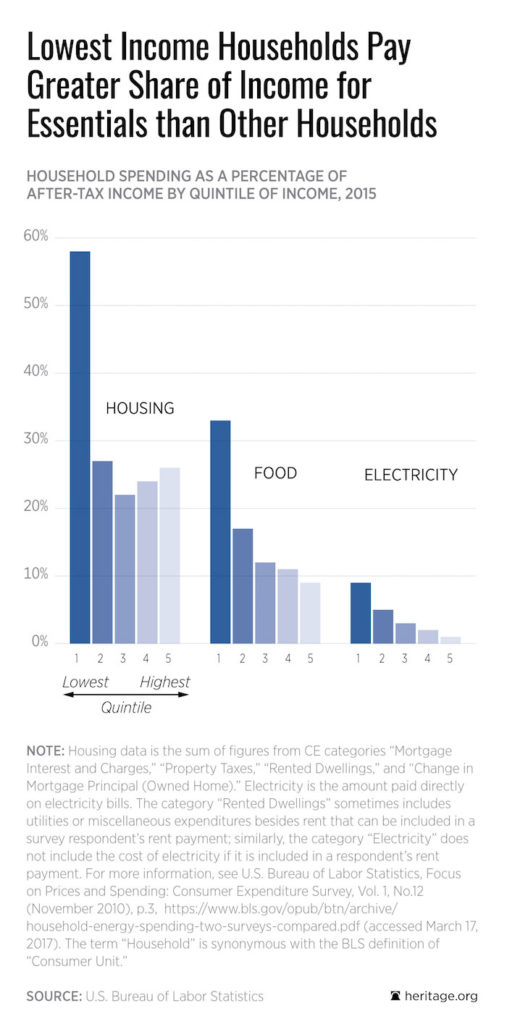Advocates for big government often equate expanding government with concern for the poor. But reality speaks to the contrary: Expanding government often has very harmful effects on the poor.
This reality is precisely what is addressed in a forthcoming special report from The Heritage Foundation, “Big Government Policies that Hurt the Poor and How to Address Them.”
Rather than looking at welfare policy—a usual focus of analysts when discussing policies that impact the poor—the report focuses on economic policy, including regulation.
The authors identify 23 policies and provide concrete solutions that would allow those struggling financially to have more opportunities and a higher standard of living. As indicated in the report, these policies are just the tip of the iceberg.
The authors found three recurring themes that marked the policies they identified:
1. Cronyism.
A significant number of the policies are classic examples of cronyism. It’s quite illuminating how government policies supposedly designed to protect allegedly vulnerable workers or consumers wind up, in reality, helping dominant producers or politically favored special interests.
2. Disproportionate impact on the poor through artificially high prices.
Many of the policies identified drive up consumer prices, such as for food and energy. This disproportionately hurts the poor because a greater share of their incomes go to meeting basic needs, as compared to households at higher income levels (see the chart below).
3. Obstacles to opportunity.
There are numerous policies that create artificial and unnecessary obstacles for the poor when it comes to obtaining jobs or starting businesses that could lift them out of poverty.
Here are four of the harmful policies detailed in the report.
1. Occupational Licensing
Laws that require official occupational licensing cost millions of jobs nationwide and raise consumer expenses by as much as $203 billion per year. These policies are often just a barrier to entry to help existing individuals in the specific field by limiting competition.
30% of Workers Need the Government’s Permission to Work
2. Federal Sugar Program
The federal government tries to limit the supply of sugar that is sold in the United States. As a result, the price of American sugar is consistently higher than world prices, sometimes even doubling world prices.
This big-government policy may benefit the small number of sugar growers and harvesters in America, but it does so at the expense of sugar-using industries and consumers.
Recent studies have found that the program costs consumers as much as $3.7 billion a year. The program has a disproportionate impact on the poor because a greater share of their income goes to food purchases compared to than for individuals at higher income levels.
3. Energy Efficiency Regulations for Appliances
The Department of Energy regulates a long list of consumer and commercial appliances, including products like refrigerators, air conditioners, furnaces, televisions, showerheads, ovens, toilets, and light bulbs.
These regulations prioritize efficiency over other preferences that customers and businesses might have—such as safety, size, durability, and cost.
While there are a number of problems with the government mandating energy conservation (such as cronyism and dubious environmental benefits), appliance efficiency regulations are likely to have a bigger negative impact on middle-income and low-income families, and likely to provide more benefits to upper-income families.
Customers and businesses might have such preferences even at the loss of some reduced efficiency.
4. Ridesharing Regulations
For years, states and municipalities have attempted to heavily regulate, and at times ban, ridesharing companies like Uber and Lyft in an effort to prop up their principal competitors—the traditional taxicab companies.
Government policies that attempt to preserve this system against competition from ridesharing firms, or which impose costly and burdensome regulations on said firms, do so at the expense of both consumers and drivers, with a particular impact on the poor.
As the report illustrates, government regulation and unwarranted intervention are often the primary barriers to progress for those who are poor. Just getting government out of the way could make a huge difference.
Here is the report’s full list of 23 big-government policies currently harming poor Americans:
- Climate Change Regulations
- Energy Efficiency Regulations for Appliances
- Fuel Efficiency Mandates and Tier 3 Gas Regulations
- Ozone
- Renewable Fuel Standard
- Tennessee Valley Authority
- Federal Sugar Program
- Fruit and Vegetable Marketing Orders
- U.S. Department of Agriculture’s Catfish Inspection Program
- Soda Taxes
- International Monetary Fund Bailouts
- Import Restraints on Food and Clothing
- Jones Act
- High Minimum Wages
- Occupational Licensure
- Economic Development Takings
- Home Sharing Regulations
- Rent Control
- Smart Growth
- Payday Lender Rules from the Consumer Financial Protection Bureau
- Daycare Regulations
- Ridesharing Regulations
- State-Sanctioned Lottery Monopolies
The Bottom Line
All levels of government—local, state, and federal—need to look honestly at how they are contributing to the poverty problem. Then, they can become part of the solution.










